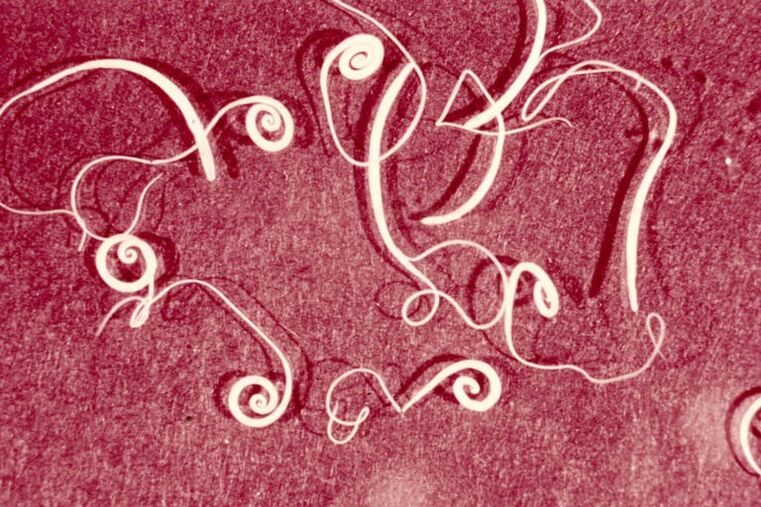The presence of parasitic organisms in the body leads not only to discomfort and the appearance of unpleasant symptoms, the development of various diseases and a significant deterioration in the state of health. Some types of parasites not only threaten health but also life. The dangerous neighborhood causes a decrease in immunity, damage to the integrity of internal organs. Doctors are sounding the alarm, more than 80% of all diseases are caused by parasites or are the result of their living processes in the body. The statistics are alarming: every 4 adults and 2nd child are infected with helminths. Usually, a person is unaware of the presence of worms until the condition becomes severe. Where do human worms come from? After all, infection occurs even in people who strictly adhere to the recommendations and try to exclude all contact with the pathogenic environment. Let's try to figure out how to avoid infection, the cause of the invasion of helminths.
Main routes of infection: Where do worms come from?

There are different ways to get a parasite infection. Worms are a problem for people of any age, although children are the most vulnerable. They get used to the world by actively exploring objects according to their interests and do not have a long-term cleaning habit. Newborns become infected mainly by using plant products without first washing them, violating the rules of hygiene after contact with pets, licking dirty fingers. Heartworm disease in children is a very common phenomenon.
The mechanism of infection with parasites of adults is practically the same. Most helminthiasis develops due to neglect of the rules of personal hygiene. Usually, infection occurs through contact with sick people or animals, and the use of contaminated utensils and household items. Meat and fish that are not treated with enough heat are also at high risk of disease. Biohelminthiases enter the human body in this way. To minimize the possibility of the development of pathology, it is necessary to carefully cook, stew or fry fish and meat. Drinking contaminated water, swimming in waters of unknown origin, or working in the garden with unprotected hands can cause worms to appear in an adult's body.

The main routes of infection are:
- Oral-fecal. Pathogens enter the body through contaminated food and water. This group of helminths mainly live in the intestines. The causative organism undergoes a full development cycle and secretes eggs, which are excreted in the feces of the host. After leaving the outside environment, the parasite is introduced into another host's body.
- Through the ground. Transmission of the parasite in this way occurs by human contact with contaminated soil. The mode of transmission is similar to the previous version of infection, but the eggs enter the ground not only in feces but also with other secretions of the host body.
- Hematology. The parasite enters the host's body through the bite of an insect. Those with sepsis carry helminth eggs.
- Biological filariasis. A complex infection system in which there are several intermediate and permanent hosts.
The life cycle of the parasite
Different types of helminths have their own development cycles, but their general scheme is identical: larvae develop from eggs, which eventually turn into sexually mature individuals.
Taking into account the peculiarities of development, there are three groups of parasites:
- contact;
- cysticercosis;
- biological worms.
Contact parasite infection mainly occurs through dirty hands. Geohelminths grow without an intermediate host. Eggs are cooked on the ground. This group of parasites enters the human body through the oral cavity or the skin. The helminths have the most complex life cycle with several intermediate hosts.
Symptoms of helminthiasis
After the parasite enters the human body, the first symptoms may appear immediately or after a while, when the number of worms increases significantly or the only representative of the species grows in sizebig. The first blow is taken by the immune system.

Signs of general deterioration of health gradually appear:
- weariness;
- poor sleep;
- listless;
- comatose;
- dizzy.
Such symptoms are caused by the increasing deficiency of nutrients and components absorbed by the parasites, impoverishing the human body. People infected with helminths become weak and irritable. Specific symptoms appear gradually, depending on the type of helminth, localized in a particular organ.
Worms in the liver
The parasite enters the organ through the bloodstream or orally. As the disease progresses, the following symptoms are observed:
- Body temperature rises several degrees. With the mass of parasites in the organ, necrosis, an abscess can begin, in which case the temperature rises to critical numbers.
- The mucous membranes and skin become yellowish as the glands produce large amounts of bilirubin.
- On palpation, the liver may be enlarged. The patient feels tissue rupture, pressing on adjacent tissues. Beginning of right abdominal pain disorder, shortness of breath.
- Clinical blood tests showed increased eosinophils.
- Often worried about feeling nauseous, having an unpleasant taste in the mouth. Some patients complain of dizziness.

Intestinal worms
Most parasites prefer to live in the intestines. It is the perfect place to feed, grow and breed. In the gut, sexually mature individuals secrete eggs, which enter the environment along with the patient's feces.
Localized symptoms of helminths in this organ are as follows:
- Indigestion in the form of constipation or diarrhea, nausea and vomiting.
- Anorexia, complete loss of appetite.
- Change eating habits. The patient refuses his favorite dishes, preferring unusual tastes.
- Presence of blood in stool.
- Very severe stomach cramps.
- Presence of parasites or their fragments in feces, vomit.
- Bowel obstruction.

Worms in the lungs
Worms enter the lungs through the bloodstream. Localization of helminths in the respiratory system causes great harm to the body. Symptoms of lung damage are as follows:
- Chest.
- Cough with phlegm.
- Increase body temperature.
- Hear a wheezing sound in the chest.
- Shortness of breath, the development of an asthma component.
With mass lung transplantation, there is a high probability of developing complications in the form of pneumonia, airway obstruction, gangrene or abscess.
Worms in the eye
Colonization of helminth larvae in the eye leads to serious vision problems. Symptoms of the presence of parasites in the eye are as follows:
- The seal is visible under the eyelid.
- Pain and movement in the eye.
- Visibility decreased sharply.
- Change the position of the eyeball.
- Stray eyes gradually increase.
- Continuous discharge from the eye.

Worms in the brain
The presence of parasites in the brain is one of the most serious conditions, as helminths irreversibly damage nerve fibers. Very often, the disease ends with the death of the patient.
The symptoms of brain parasites are:
- Severe migraine headache.
- Dizzy.
- Nausea vomiting.
- Join the neuropsychiatric disorders.
Helminthic Invasive Therapy
Parasites in the body of adults and children are often detected. The perception of the presence of pathogenic individuals in one's own body is quite unpleasant. It is necessary to start the correct treatment in a timely manner. Only a qualified therapist can prescribe an anthelmintic.
To confirm or deny your suspicions, you need to be examined and tested.
Your doctor recommends any method to detect helminths: complete blood count, stool, urine, ultrasound or X-ray, endoscopy or CT. Based on the type of parasite identified, treatment is prescribed. The pharmaceutical industry is ready to come up with a lot of effective anti-worm drugs. Treatment can be carried out with the use of a single drug or a course of treatment. It all depends on the type of parasite, its place of residence, number, as well as the general condition of the patient.
When detecting the fact that the family has helminth infections, it is advisable to conduct treatment for parasites in the body for everyone living together. Human helminths are not only an unpleasant disease, but also a very dangerous disease, which threatens to develop with many complications. You cannot ignore the situation or use the drugs yourself. Only a doctor can prescribe a remedy that is as effective as possible and does not cause harm.
There are folk recipes that can become a powerful aid for the body against helminthiasis. The drug can be used as an adjunct to drug therapy or for prophylaxis. It should be understood that you cannot arbitrarily use traditional medicine. Initially, you need to find out information about the parasite, find out where it resides. If possible, your doctor will recommend adding alternative prescriptions to your treatment regimen.
The following herbal ingredients are considered the best folk remedies: pumpkin seeds, wormwood, ginger, herbal preparations, grated root, buckthorn.

Preventive action
Worm infestation is not as harmless as it might seem at first glance. The disease degrades health, negatively affects the general condition of the disease. For infants, helminthiasis is much more dangerous: children with severe retardation, or minor illnesses.
Preventive measures are very simple and easy to do, you just need to form a few good habits:
- Wash hands before eating, after walking, visiting public places.
- Conduct deworming for pets.
- Eat only washed plant foods.
- Do not drink unboiled water, do not swim in waters of unknown origin.
- Work in the garden or vegetable garden with gloves.
- Thoroughly prepare meat and fish dishes.
- Refusing to buy food at the spontaneous market.
And while it's not possible to completely protect against a helminth infestation, it is actually possible to reduce the risk by following your therapist's recommendations. Don't get sick!





























